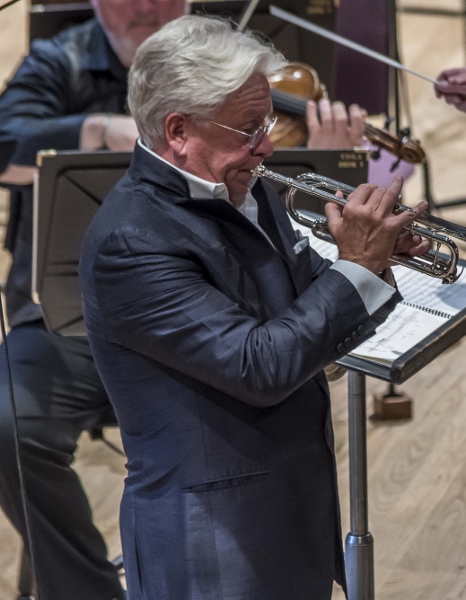Two splendid pieces of orchestral virtuosity began and finished the second Saturday concert by the BBC Philharmonic under John Storgårds at the Bridgewater Hall. It was given the title of “Mischief and Magic”, an apt summary.
For mischief we had Richard Strauss’s Till Eulenspiegel’s Merry Pranks, perhaps the most perfect of his orchestral tone poems in that it not only tells a story but is beautifully shaped and balanced as an extended classical rondo.
The episodes were given their folklore-based descriptions by Strauss (“Through the market he rides”, “Dressed as a priest he oozes unction”, “The cavalier, exchanging courtesies with beautiful girls”, “Revenge on all mankind”, etc., and at the end the scenes of the law catching up with him and the hangman’s noose are all too obvious). But the musical structure was uppermost in Storgårds’ presentation: the pauses in the score as one incident unfurls after another being only minimally observed. And the playing was masterly, from the charm of the “Es war einmal…” (“Once upon a time…”) opening to the percussion-led drama of the judgment scene.
Three individual players always stand out in Till Eulenspiegel: the solo horn and D clarinet player who together represent him and his two themes, and the leader of the orchestra (the Philharmonic’s Zoë Beyers on this occasion) who as soloist represents the love interest: this performance was no exception. The pictorial individuality and discipline of the playing in every area were exemplary.
The second part of the whole evening was the complete ballet score of Petrushka by Stravinsky, given in its opulent original orchestration, with quadruple wind and seven percussionists. The music always evokes for me the memory of seeing Nureyev in the title role (in which he was a master even in his later years), on tour with his Paris company, and there is nothing like seeing the ballet danced while hearing the music, but with a platform-filling orchestra, composed of players of the Philharmonic’s calibre, it proves a thrill purely as concert music.
Under Storgårds’ direction, all the textures were clear, the wind playing exemplary, the gentler moments thoughtful and the sense of mystery apparent (that’s the Magic for you in the concert title).
 Between the big showpieces we had a big man – and good friend of the BBC Philharmonic – in Håkan Hardenberger (pictured left), the soloist in both Haydn’s Trumpet Concerto and Betsy Jolas’ Onze Lieder of 1977. Hardenberger has not been averse in the past to trying a spot of busking in Lower Mosley Street on a cold February day (in partnership with Hans Gruber and accompanied by accordion): this time his first role was to demonstrate purity of tone and classical restraint, with a chamber-sized orchestra to show it off to the best. His playing was both warm and tender in the song-like and gentle middle movement and lively and spry in the outer ones. He gave his own solo cadenza to the first movement – admirably showy and short, with something of a debt to Three Blind Mice in it.
Between the big showpieces we had a big man – and good friend of the BBC Philharmonic – in Håkan Hardenberger (pictured left), the soloist in both Haydn’s Trumpet Concerto and Betsy Jolas’ Onze Lieder of 1977. Hardenberger has not been averse in the past to trying a spot of busking in Lower Mosley Street on a cold February day (in partnership with Hans Gruber and accompanied by accordion): this time his first role was to demonstrate purity of tone and classical restraint, with a chamber-sized orchestra to show it off to the best. His playing was both warm and tender in the song-like and gentle middle movement and lively and spry in the outer ones. He gave his own solo cadenza to the first movement – admirably showy and short, with something of a debt to Three Blind Mice in it.
But there was more. Onze Lieder is a bi-lingual title for a piece by a Parisian written for French musicians, but it’s clear in its structure (an introduction and 11 short movements) and full of variety and fun, not least in its demonstration of the raspberry-like “pedal” note of the trumpet at fundamental pitch (equalled by the same from an orchestral trombone). There are moments of jazziness (mutes in play), lyricism, virtuosity and a gasping solo dirge.
That was all in good measure, but Hardenberger signed off with his own voluntary: an extra piece everyone loved. He’d brought his flugelhorn and played it in a sweet orchestral arrangement of Joni Mitchell’s Both Sides Now.
- To be broadcast on Radio 3 on 14 October
- More classical reviews on theartsdesk















Add comment